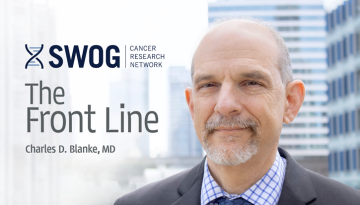Trial Review Letters Now Flying Out Our Door
We’re slow. That’s the knock on SWOG Cancer Research Network and all members of the National Clinical Trials Network funded by the National Cancer Institute. In the case of our triage letters, that criticism was valid.
Triage calls are arguably the most important we hold at SWOG. The triage, or executive review, team gathers most Monday mornings via conference call to review and vote on trial concepts coming out of our committees. Principal investigators present their trial to SWOG executive officers and answer important questions. Committee chairs usually discuss the trial’s prioritization. Then they jump off the call and we all vote. Green, red, or yellow light – the collective decision, along with comments and next steps, is outlined in a post-call letter sent to the PI. Triage letters carry big news: the results of a vote on whether or not their trial idea can move forward to the National Cancer Institute, plus changes or considerations they must make before submitting.
But we had a problem at SWOG. Triage letters took anywhere from one to six weeks to get to the principal investigator. On average, it took two or three weeks. In a couple of rare cases, it took five months! This was unacceptable to me, and to my senior staff, executive officers, and committee chairs.
So, we went to work to shorten delivery times. It’s proved a tough nut to crack. Writing triage letters requires a high level of knowledge, judgement, tact, and authority (you have to poke at a lot of high-level physicians to get those letters out the door). Letters also require a litany of approvals across offices and institutions, including from executive officers, protocol staff, various SWOG experts in law, finance, biobanking and other areas, and, ultimately, SWOG operations chief Dana Sparks. It’s no wonder the process was slow.
To speed it up, we tried assigning different letter specific authors. We created a tracking system for approvals. Nathan Eriksen, our chief of administration, even worked with a group of master’s degree students from the University of Michigan’s School of Information to come up with solutions. Their recommendations: Create clear deadlines, improve internal communication, and create a feedback form for executive officers.
That’s just what we did.
I set a clear, tight deadline: Triage calls happen on Mondays. The principal investigator gets their decision letter no later than that Friday. So the work gets done in five business days or fewer. We created a database in Sharepoint that every key player can access, improving communication. We also settled on new authors. SWOG’s three clinical trial project managers, based in our operations office, in April took over the task of writing triage letters and ensuring that the same-week deadlines are met. Kudos to Dana Sparks and Norb Strauss for restructuring our operations office last year and creating these new protocol leadership positions, and for assigning the triage letter task to just the right folks. Clinical trial project managers have the expertise and authority to manage the process and get the job done quickly.
Finally, kudos to Nathan Eriksen. He created a new triage feedback form using Office 365, a cloud-based suite of tools and apps generously funded by our Hope Foundation for Cancer Research. Under the new feedback system, executive officers get a URL by email prior to each triage call. They click the link, and up pops a fast form where they can submit comments, questions, and suggestions right after the triage call. No password required!
We started using the new form on May 18. Since then, we’ve sent out 13 triage letters. Every letter went out within a week, meeting the strict deadline I set. All but one went out in just one to three days! We’ve finally landed on a successful new process, and I would argue this is how major progress is made – one small victory at a time.
Expect more to come. We’re hiring a new information technology specialist in the group chair’s office who’ll use data and technology to make us all more effective and efficient. We hope to have someone on board this fall. I’m looking forward to telling you about more time and money-saving innovations, ones that will improve our trials for patients.
Other Recent Stories



